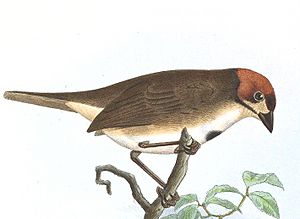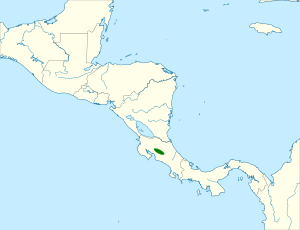Cabanis's ground sparrow facts for kids
Quick facts for kids Cabanis's ground sparrow |
|
|---|---|
 |
|
| Conservation status | |
| Scientific classification |
|
| Kingdom: | Animalia |
| Phylum: | Chordata |
| Class: | Aves |
| Order: | Passeriformes |
| Family: | Passerellidae |
| Genus: | Melozone |
| Species: |
M. cabanisi
|
| Binomial name | |
| Melozone cabanisi (PL Sclater & Salvin, 1868)
|
|
 |
|
| Script error: The function "autoWithCaption" does not exist. | |
| Synonyms | |
|
Melozone biarcuata cabanisi |
|
Script error: No such module "Check for conflicting parameters".
The Cabanis's ground sparrow or Costa Rican ground sparrow (Melozone cabanisi) is a special type of New World sparrow. It was once thought to be a subspecies of the Prevost's ground sparrow, but now it's recognized as its own unique species.
This bird lives only in central Costa Rica, which means it is endemic to that area. Sadly, the Cabanis's ground sparrow is listed as "Near Threatened" by the IUCN. This is because its natural home is quite small and has been shrinking due to cities and towns growing. There aren't many of these sparrows left, with an estimated population of only 20,000 to 50,000 adult birds, and their numbers are believed to be decreasing.
Contents
Discover the Cabanis's Ground Sparrow
What Does This Bird Look Like?
The Cabanis's ground sparrow is about 15 centimeters (6 inches) long and weighs around 28 grams (1 ounce). It has a short, dark-grey beak. Its upper body is a plain olive-brown color, and it has a reddish-brown (called rufous) cap on its head. The underside of its body is mostly white.
Young sparrows look a bit different. They are browner on top and have more yellowish undersides. Their head patterns are also not as clear as the adults'.
Spotting Unique Features
The reddish-brown color on the adult's head stretches back behind its eyes. This reddish area has a black border in the front, but this border is broken by a white ring around the eye. The bird's forehead is white, with a thin black line just below it. It also has a black stripe on its cheek (called a malar stripe) and a black patch in the middle of its chest.
See also
 In Spanish: Toquí costarricense para niños
In Spanish: Toquí costarricense para niños
 | Charles R. Drew |
 | Benjamin Banneker |
 | Jane C. Wright |
 | Roger Arliner Young |


